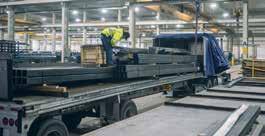
31 minute read
Taillights
Specs at a glance

Advertisement
• 150+ Class 8 trucks, exclusively Mack • Latest models are Anthem • Most are day cab tractors, plus three 56-inch fl at top sleepers and two 70-inch stand up sleepers, two Pinnacle straight trucks and four Granite roll offs for the company’s recycling division • Mack Anthem specs include MP®8 445 horsepower engine, mDRIVE 12-speed AMT, air ride suspension • In-cab and exterior camera systems
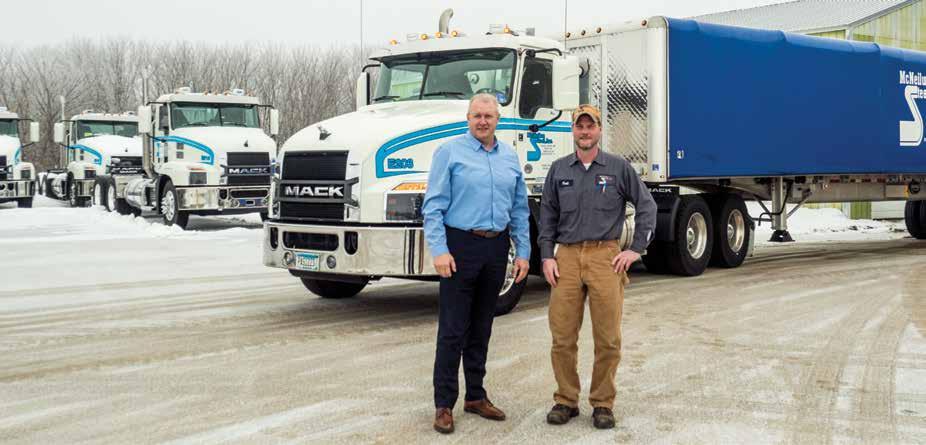


added,” Sylvester says. “People want us to hold their inventory rather than hold the inventory on their fl oor. It’s our job to keep their inventory on our fl oor and make sure it’s there when they need it.” That’s where their Macks come in. The transportation side of the company runs 24 hours a day, six days a week. They take next-day orders from customers until 4 p.m. each day and stage loads as the orders come in. After drivers return trucks at the end of the day, a night crew loads the next day’s deliveries. Many loads are multistop runs, so the trucks must be loaded in the correct sequence of material. Each delivery is barcoded and scanned to ensure quality and precise delivery. Drivers will come in as early as 3 a.m., depending on their fi rst delivery. The fl atbed trailers all have retractable covers to keep the product dry and protected from elements. Sylvester notes this makes operations more effi cient, safer, higher quality and easier on drivers. Another benefi t is that safety inspectors are more confi dent in their operations when they do get stopped.
Having a quality tractor is also a big plus.
“We’ve had nothing but positive feedback for the Anthem.” Drivers love it, especially the dash layout, driver environment and the look of the truck itself, Sylvester says. Plus, the Mack mDRIVE™ automated manual transmission has become a big hit with drivers. “Once they get the automatic transmission, they love it. It’s a change that takes some adjustment. They usually fi ght it at fi rst, but after driving it a while, they love it.” mDRIVE gives the fl eet more fl exibility with drivers who have less experience, too, an important consideration since the labor pool is smaller in the rural areas where McNeilus operates. Running in the winter in the upper Midwest and the Great Plains of North Dakota is hard service for trucks. When storms come, “We do the best that we can do. We never put a driver in harm’s way on the road, it’s whatever he’s comfortable with.” Sylvester says their customers know if they can’t get it there one day, they get it there the next. Even though many of their vehicles are day cabs, the fl eet’s trucks cover a lot of ground, with drivers averaging 500 miles per day. The Macks stay in operation for 900,000 to 1 million miles. “If the truck runs well, they keep it longer,” he says. The Anthems’ fuel economy is another positive for the fl eet, along with maintenance costs. McNeilus does most of its own maintenance in-house, with 12 technicians under the direction of Shop Manager Todd Aarsvold. They can send out their own repair truck if they have a vehicle off road, and
COVID-19 update
“We are operating under the CDC guidelines. We sanitize all high touch points several times a day and continually educate employees on safe practices while also supplying them with what they need to stay healthy. “Our business has only decreased minimally. We are in daily contact with our customers, checking on what is happening in their market. We are optimistic moving forward and believe that while business may be slower for a few months, essential items still need to be produced. Also, if the infrastructure bill gets passed, it will be a huge boost to construction equipment manufacturers.”
— Glenn Sylvester, chief operating offi cer of McNeilus Steel
TOP: McNeilus Steel Chief Operating Offi cer Glenn Sylvester, left, and Shop Manager Todd Aarsvold on a typical January day in Dodge Center, Minnesota. BELOW: A McNeilus driver checks his manifest to make sure materials are in order and complete for delivery inside the company’s drive-through loading facility.
smaller issues can be brought back to the shop and repaired overnight so they are ready to go the next day. The Dodge Center location has seven full-time mechanics operating on two shifts so they can handle issues when the trucks are returned. Sylvester says the main reason for the emphasis on in-house maintenance is for customer service, making sure any truck issue doesn’t prevent them from delivering the product their customers need. Making the delivery on time is so important the fl eet even has standby trucks.
The fl eet enjoys very good relations with its “exceptional” dealer.
McNeilus Steel has been a fl eet customer of Nuss Truck & Equipment, Rochester, MN, for more than 30 years and share many of the same values as both are multi-generational, family-owned businesses, according to Bob Nuss, president of the dealership.
“We have a very close relationship with McNeilus Steel from the shop technicians to top management,” Nuss says. “We value our customers and team members like family.” The last 10 years have been good for McNeilus Steel. Employment has more than doubled to over 700 employees and the fl eet has grown by 50 trucks. The trucking operation is completely integrated into the company. “It’s part of who we are.” The drivers are salespersons who works with the customer, which Sylvester considers a big advantage. The growth has been both a benefi t and a challenge, he says. The family-owned environment helps them keep new employees, but fi nding them to begin with is sometimes a challenge. The keys to success for the company have been a combination of positive factors, including continued reinvestment into the company. But he also says it’s more than that. “We have good partners for steel, trucks and equipment.”
Experience matters

De Beradinis Heavy Haul is a young fleet with old Mack roots
COVID-19 update “Our employees are doing well. We follow the social distancing guidelines including use of face masks in Osceola county and have supplied our employees with access to Clorox bleach wipes to sanitize the cabs as needed. We never slip seat trucks so the chances of our drivers spreading the virus that way is not an issue.
“We are very optimistic that our economy will come back by the end of Q4, and be stronger than ever. There’s too much heavy civil work that needs to be finished not to.”
— Lou De Beradinis, owner and president of De Beradinis Heavy Haul Story and photos by Jim McNamara
One man’s economic downturn is another man’s opportunity. In 2006 Lou De Beradinis started Central Florida Landscape Materials, delivering rock, stone, sand and other materials to landscapers in the Orlando area when he was only 18 years old.
De Beradinis noticed that customers frequently asked him to move and deliver their own equipment to and from jobsites. In fact, his trucks were soon spending more time moving other people’s supplies and equipment than supplying materials. This business picked up during the Great Recession when other companies got rid of their own trucks to save money. “We were good at it, and it was profitable, and that’s when we decided to shift gears and change into a transportation business,” De Beradinis says.
In 2011, the company changed its name to De Beradinis Heavy Haul. De Beradinis’s fleet specializes in heavy hauls, often over 200,000 pounds gross vehicle weight rating, and moves everything from skid steer loaders to 140,000-pound excavators and drill rigs. “Pretty much anything equipment-wise that someone needs hauled, we’re capable of doing it.”
He’s a third-generation trucker. His grandfather owned McFadden Express, a New England common carrier, in the 1940s and 1950s, while his father drove a dump trailer for a period, before moving to Orlando and starting a successful ready mix and materials company (both had operated fleets of Macks and were fans of the brand).
From the start as an 18-yearold, De Beradinis knew he wanted to have his own fleet and all the experience that
“I was a young guy, thinking you’re going to do heavy haul and you need the 600 horses and 18-speeds and all the gauges and the stuff that an owner-operator wants.”
That’s where the experience factor comes in. “You have a different idea of what you want as an owner-operator and as a fleet owner,” De Beradinis says. “Ten years later, going from a one-truck operation to owning four or five trucks and buying more, we had to decide what
comes with it. route we wanted to go.”
“I got to call shots, I got to lose my ass, I got to make
Part of the experiment was to buy two used Mack Granite®
some money, I got to do it all. A models, each five to six years
lot of good experiences, some old at the time with between
bad experiences, but the end 300,000 to 400,000 miles. The
result was that down the line we became pretty successful at what we were doing. We found
Lou De Beradinis, owner and president of De Beradinis Heavy Haul, Orlando, Florida.
only real difference was that one was an axle forward and one an axle back, so he could
what worked.”
It took some time and experimentation to find what worked. One bit of experience was the benefit of operating Mack® trucks, especially the reliabilevaluate which worked better for his operation. De Beradinis was also interested in how the Mack exhaust aftertreatment systems (EATS) performed in “mature” trucks.
ity, durability, toughness and fuel economy. De Beradinis shifted to Mack after running competitor trucks for a couple of years.
“We found out that they both did the job very well. We were pleased with both mod-
els.” The axle position difference “really just
came down to driver preference,” while the EATS was “pretty much issue free.”
He also is a fan of Mack’s integrated powertrain design and manufacturing. “Everything’s built to work together. Nothing’s overspec’d or overbuilt for the next component. When go out on a job site, you don’t have to worry about breaking axle shafts because that truck was designed from bumper to bumper by Mack.
“When we deliver a 200,000-pound rig and we have to leave the road, you have to know that whatever’s under the hood, that you’re

going to put it all to the ground. You can’t afford to have any kind of slippage.” And that’s a 13-liter MP®8 delivering that special permit load, too.
Mack’s ruggedness and higher ground clearance are another plus. “Macks have never left us stranded on the job site anywhere. It’s a rugged work truck. They’re bulletproof.”
In the past two years, De Beradinis Heavy Haul disposed of its non-Mack trucks and doubled the size of the fleet to 10 trucks. One of the new trucks is actually a model year 2018 Titan by Mack that he traveled to Alberta last year to pick up from the dealer. That was a “holy grail truck” for a Mackfanatic heavy hauler, he says.
He also acquired two new Mack Granite triaxle tractors, with 505 hp MP8 engines, 18-speed Mack transmissions, 52,000-pound
Old trucks are seductive. The soul of an old machine can call out to those who live daily with the modern version and create a counterpoint to the computer-controlled wonders of today’s highways. For Lou De Beradinis of De Beradinis Heavy Haul, they are also a way to connect to his father and honor his grandfather’s trucking legacy. “It’s cool to look at trucks that my grandfather would have driven or my dad drove. I feel like we’re historians, preserving trucks, and bringing trucks back that would’ve gotten cut up by a torch.” De Beradinis restores old Macks as a hobby and currently has several antique Macks that they are rebuilding. “It’s a passion, it’s a hobby ... it’s become an addiction. One turned into two turned into three.” He says he’s always on the hunt for the next one. Once finished, De Beradinis uses them for advertising and parades. “It gives us something to do outside of work.” De Beradinis and his family rebuild trucks from the bare frame up. He says they’re not afraid to strip trucks down and put them back to good use. All the restoration work is done in-house. capacity Mack rear axles and double frame rails. These frequently are matched to 13-axle lowboys. He said one of these combinations weighs 90,000 pounds — unloaded.
“We spec’d those exactly how we wanted them. When you build the right truck for the job, and it has the right spec, full-locking axles and rear ends, it’s definitely the right way to go.” The fleet also operates several rollbacks and flatbeds.
“A lot of the job sites can be treacherous — very demanding on the trucks and trailers. Every time we move a drill, there could be 10 to 15 loads of support equipment that goes with that drill to move the whole operation. It’s not your typical pallets or palletized material. This is stuff that’s complicated and specialized, items that you have to think about how you’re going to strap it, chain it, load it.”
“Every project has its own set of skills. You definitely have to learn all sorts of skills.” For instance, he learned how to use hot rivets to replicate a dump body on a 1929 Mack AK, including building the forge.
There was a learning curve before the riveting was acceptable. “What I can tell you about hot rivets is that even if they’re not pretty, they’re a great mechanical fastener,” he joked.
“We don’t believe that trucks and trailers are disposable. That’s another reason Macks are such a good fit for us — with a little bit of love, you can give them a second life.”
His first Mack was a 1969 R model single axle dump truck that his dad bought for him to start his landscape material business. Other vintage Mack trucks he has include: • 1941 Mack FJ • 1939 Mack FK • 1969 Mack R600 steel nose • 1937 Mack AC4 • 1929 Mack AK (finished) • 1987 Mack R686 tandem axle tractor (finished) • 1991 RD822SX • 1992 RD888
De Beradinis driver Garth Isaacson prepares tie-down chains to secure his load, a large excavator.
This requires drivers with the right experience, training and attitude. “The guys really have to be in the game at all times.” Once the trucks are in operation, the fleet works hard to keep them on the road. “We do the majority of our maintenance in house, preventative maintenance and we are meticulous on inspections, tires and simple repairs.” More intensive repairs are handled by his local dealer, Nextran Orlando, and the service manager Luciano Ramirez, who De Beradinis praises for customer service. “He gave me his cell number to call anytime.” “Our uptime on the Mack is great — we hardly have any downtime, and if we do, our local dealer is very focused on getting our trucks in and out. They understand that we’re a small company and that every day we have a truck in the shop is lost revenue. We are very lucky to have that relationship.”
The attention to detail pays off.
“I know a lot of the customers that we work for use us because they know that our trucks are reliable. They know that when we say we’re going to be somewhere, that we’re there, and that when we pick up that piece of machinery, that we’re going to make it from point A to point B. Our track history proves that we know what we’re doing. “If our fleet’s not reliable, then we’re not
Can’t have too many Macks
reliable.”
A 1937 Mack AC4 in early stages of restoration at the De Beradinis shop.
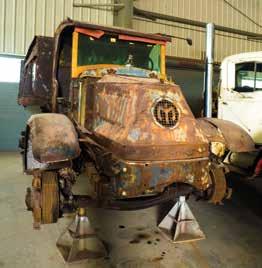
De Beradinis says restoring them is only part of the habit. Caring for them can be even more time consuming.
“There’s a lot of dedication in taking care of them as well. You have to preserve them, you have to wash them and wax them. The tires go bad before you ever use them because they just lay around. You have to transport them to shows. You have to maintain them. It’s really a labor of love.
“Anybody can go buy a truck and restore it. Sharing that history is the important part.”
Mack continues its 120-year tradition of axle excellence

85,000-pound S852 tandem drive axle is newest addition to product line
Mack’s long, rich history of engineering and manuof engineering and manufacturing its own powertrain components has been leveraged to develop the 85,000-pound S852 tandem drive axle. This new rating “fi ts with our philosophy that components This new rating “fi ts with our philosophy that components designed to work together simply work better,” says Roy Horton, Mack Trucks director of product strategy.
“The new 85,000-pound rating opens up a new market for “The new 85,000-pound rating opens up a new market for us,” adds Tim Wrinkle, Mack Trucks construction product us,” adds Tim Wrinkle, Mack Trucks construction product manager. “The biggest one is heavy-duty mining trucks. With this manager. “The biggest one is heavy-duty mining trucks. With this axle’s higher capacity, we are able to serve that market effectively.”
The S852 axle, like other axles in the Mack® product line, features a cast ductile iron axle housing. “A lot of other manufacturers weld their axles together, but by having a cast housing, the axle has extra durability and strength,” Wrinkle says.
The new axle also has a creep rating of 105,000 pounds for when the truck is off-road and operating at very low speeds.
Low-traction situations can be a challenge for truck drivers and can impact productivity. To address this issue, Mack offers standard interaxle and optional interwheel power dividers on its axle line. These power dividers automatically distribute up to 75% of torque between the slipping and nonslipping axle. “This elegant engineering solution is proven and reliable and requires no intervention from the driver,” Horton says.
All Mack axles are engineered with a double-reduction design and use Durapoid bevel and helical gears, whose design helps eliminate localized stress and loading on the gear tooth end while also providing enhanced strength and longer gear life. Frictional losses are reduced
with this gear design, allowing with this gear design, allowing Mack axles to deliver up to 1.5% Mack axles to deliver up to 1.5% improved fuel effi ciency. improved fuel effi ciency.
Mack’s fi rst drive axles were Mack’s fi rst drive axles were found on the original Mack bus found on the original Mack bus model built in 1900 by the Mack model built in 1900 by the Mack
Brothers Company. In 1920, Mack introBrothers Company. In 1920, Mack introduced double-reduction architecture to its duced double-reduction architecture to its axles. This major design advancement reduces the speed axles. This major design advancement reduces the speed from the drive shaft before transmitting torque to the axle shaft, as well as from the drive shaft before transmitting torque to the axle shaft, as well as helping spread and balance loading over two gear sets. Today’s Mack axles still feature that double reduction design as well as other design advances that have resulted from the company’s continuous research and development efforts.
Mack axles feature a top-mounted carrier design that is less prone to main seal leaks but also provides two inches of additional ground clearance for improved maneuverability on construction sites and in other off-road applications.
The top-mounted carrier design improves driveline angles between the drive axles. A typical prop shaft angle is 3.5 to 8 degrees, but Mack’s prop shaft angle is just 1-2 degrees. “This leads to longer u-joint life,” Wrinkle says. “If you have a 5.5-degree angle in that joint, you are going to reduce joint life by 50%.” All Mack proprietary axles are built in the United States. For 120 years, Mack has been making proprietary axles to meet its customers’ needs. Wrinkle says the proprietary axles deliver the performance demanded across a wide range of tough applications.




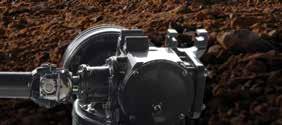
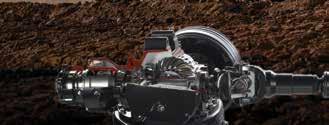


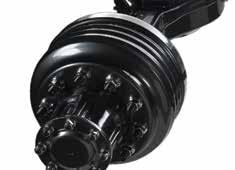
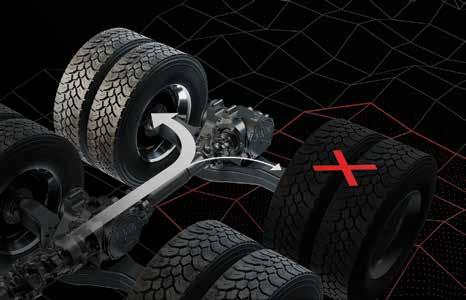
Left: Mack inter-axle power dividers automatically distribute up to 75% of torque to the axle with traction to provide power where it’s needed. Right: Mack inter-wheel power divider provides increased driveablity in poor traction situations.



Built for medium duty Mack Trucks returns to the medium-duty market

Seventeen years after exiting the medium-duty market, Mack is back in with its new Class 7 Mack® MD7 model and the Class 6 Mack MD6 model. “It’s good to be back,” says Jonathan Randall, Mack Trucks senior vice president of North American sales and marketing.
Randall says medium-duty customers could be traditional Class 8 customers who don’t want to split OEMs as well as the new customers from an expanded customer base.
Medium-duty markets include dry van and refrigerated, dump and tank vocations, pick-up and delivery businesses and private fl eets.
As hauls have shortened and consumer service level expectations have increased, the growth and stabilization of the medium-duty market created opportunity for Mack. “Mack’s dealer network has been asking for a return to medium duty for years, and we listened,” Randall says. He says initial response has been positive and customers say it hits the mark from a style and usability standpoint.
“With the Mack MD Series trucks, Mack now offers a complete lineup of Class 6 to 8 vehicles, which will enable us to meet the needs of those customers desiring Mack’s legendary durability in a lighter weight gross vehicle weight rating confi guration,” Randall says. The new models will be available later this year, and a commercial driver’s license is not required to operate the MD6 model as long as the payload is nonhazardous.
The Mack look and feel
The exterior of the medium-duty models was inspired by the Mack Anthem®, Mack’s highway model, matching its bold look and styling through the grille and hood design. The driver-focused interior of the Mack MD6 and MD7 models incorporates a comfortable, wrap-around dash with ergonomic features from Mack’s Class 8 truck models; a tilt and telescoping steering column with fl at- bottomed steering wheel; power windows and door locks; cruise control; and driver airride seat. These driver comforts ensure a quiet ride for drivers much like the ones Class 8 drivers enjoy.
Offering a sharp wheel cut for enhanced maneuverability in tough urban settings, the MD6 and MD7 cabs feature an industry-best bumper-to-back-of-cab measurement of 103 inches. The MD Series also offers a clear back of cab and top of frame rail to accommodate a multitude of body confi gurations and make it easier for body builder adaptations.
Eight wheelbase lengths are offered with the Mack MD Series, supporting typical bodies ranging from 10 to 26 feet. The vehicles come standard with 22.5-inch wheels or optional 19.5-inch wheels.
The Mack MD Series will be supported through Geotab Go, offering access to Mack OneCall™ agents, available 24/7 at the Mack Uptime Center based in Greensboro, North Carolina.
Mack recently announced that the MD Series will be built at a new facility located near Roanoke, Virginia, with production slated to start later this year.
“As we continued to look at the strength of the market and the surge of last mile delivery, hub and spoke, we see a lot of stability versus the ebbs and fl ow of traditional long-haul. There’s a huge chunk of businesses such as beverage and furniture pickup and delivery that love the Mack brand and appreciate the 400-plus dealer network and support of a company that’s been building trucks since 1900,” Randall says. “Interest has been high and dealers are accepting orders now.”
Go to macktrucks.com for detailed specs about the new Mack MD Series.
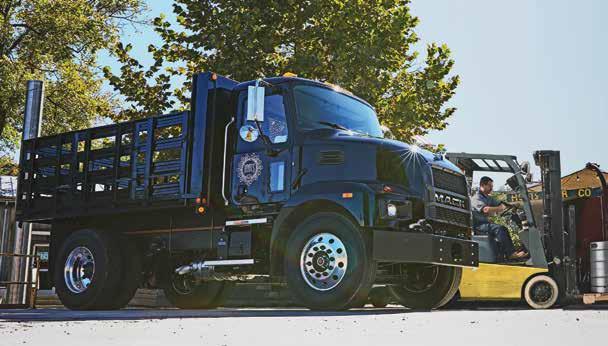
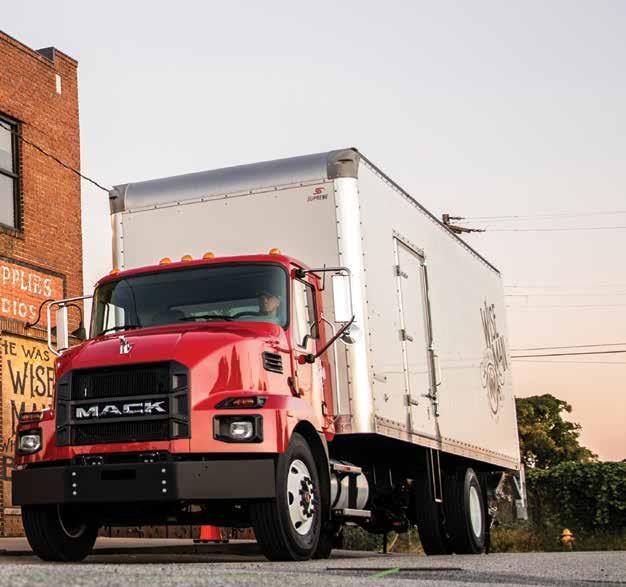
Mack Trucks returns to the medium-duty market with the highly anticipated all-new Mack® MD Series.
Mack® Command Steer

Mack eases driver effort on highway, jobsite with Command Steer for Mack Anthem® and Mack Granite®
Mack Trucks is making the job of the highway truck driver and the heavy-duty construction operator easier with the introduction of Mack® Command Steer for the Mack Anthem® and the Mack Granite® axle back. Mack Command Steer, the latest in driver-assist technology, will be available for order on Anthem and Granite models later this year.
On highway
A highly advanced active steering system, Mack Command Steer adds an electric motor to the existing hydraulic steering to help reduce driver effort up to 85% and improve driver productivity and comfort.
“Even with the all-day comfort provided by the Mack Anthem model’s ergonomic interior, driving a heavy-duty truck remains a highly physical task,” says Stu Russoli, Mack highway product manager. “With Mack Command Steer, we’re helping reduce driver fatigue and muscle strain by up to 30%, improving safety and productivity as well as helping to protect the truck’s most valuable asset: the driver.”
Russoli says driver reaction from earlier test drives shows that drivers are amazed at how well the new steering system works. “When they are driving across the country and the wind is blowing hard on one side, they report relief over not having to fight the wheel. The drivers I’ve talked to say they are a lot less fatigued, it makes it much easier to keep the truck in the lane,” he says.
Mack Command Steer provides variable steering assist based on the driving situation. Multiple sensors throughout the truck monitor road conditions, driver inputs and even environmental elements, and the system relays those observations more than 2,000 times per second. The system’s electric motor then applies additional torque as needed to the steering, making it easier to keep the truck on the desired path. “The additional torque, or steering force, provided by Mack Command Steer means drivers no longer have to ‘fight the wheel’ while driving on poor roads or in difficult weather conditions,” Russoli says. “This helps drivers maintain greater control and keep their focus on what’s ahead, enhancing safety for everyone on the road.” Another unique capability of Mack Command Steer is a return to zero feature that automatically returns the steering wheel to the center or zero position, helping simplify maneuvers in tight spaces, whether going forward or in reverse. “It’s not just a motor that helps you steer easier, it’s a really smart brain that monitors terrain, driver inputs and environmental elements for increased driver safety and comfort,” Russoli says.
Mack Trucks is making the job of the highway truck driver easier with the introduction of Mack® Command Steer, the latest in driver-assist technology, in Mack Anthem® models.
Later this year, Mack Trucks will begin offering its highly advanced Mack® Command Steer active steering system for Mack Granite® axle back models.
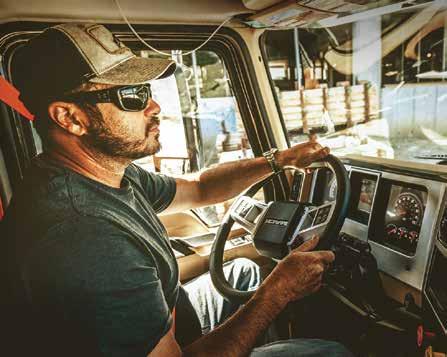
Construction jobsites
Mack is also making operating a heavy-duty construction truck easier and safer, by bringing the benefits of Command Steer’s active steering system to the rigors of jobsites.
“Driving a fully loaded, heavy-duty construction truck is a physically demanding task, especially when you add the uneven terrain common to most jobsites,” says Roy Horton, Mack Trucks director of product strategy. In addition, Horton says that to significantly reduce steering effort at slow speeds, Command Steer also helps filter out uneven terrain such as the holes, dips and ruts common to most jobsites. When such an irregularity is detected, the system reacts to counter the steering force, smoothing steering feedback and reducing the possibility of steering wheel “kicks.” “The system will also compensate for situations like strong winds and crowned roads, helping drivers maintain greater control so they can focus on the task at hand,” Horton says.
Mack Command Steer’s return-to-zero feature helps simplify tight maneuvers, such as backing a trailer or positioning a dump or mixer to unload.
CELEBRATE THE BULLDOG
Mack Superliner Graphic T-shirt M4447
Honor the past while building the future.
Mack Legacy Dark Tan Retro Cap M2440 Mack Legacy Kelly Green Retro Cap M2437 Red, White and Blue Mack Retro Cap M3307 Mack Black Mesh Cap M2310

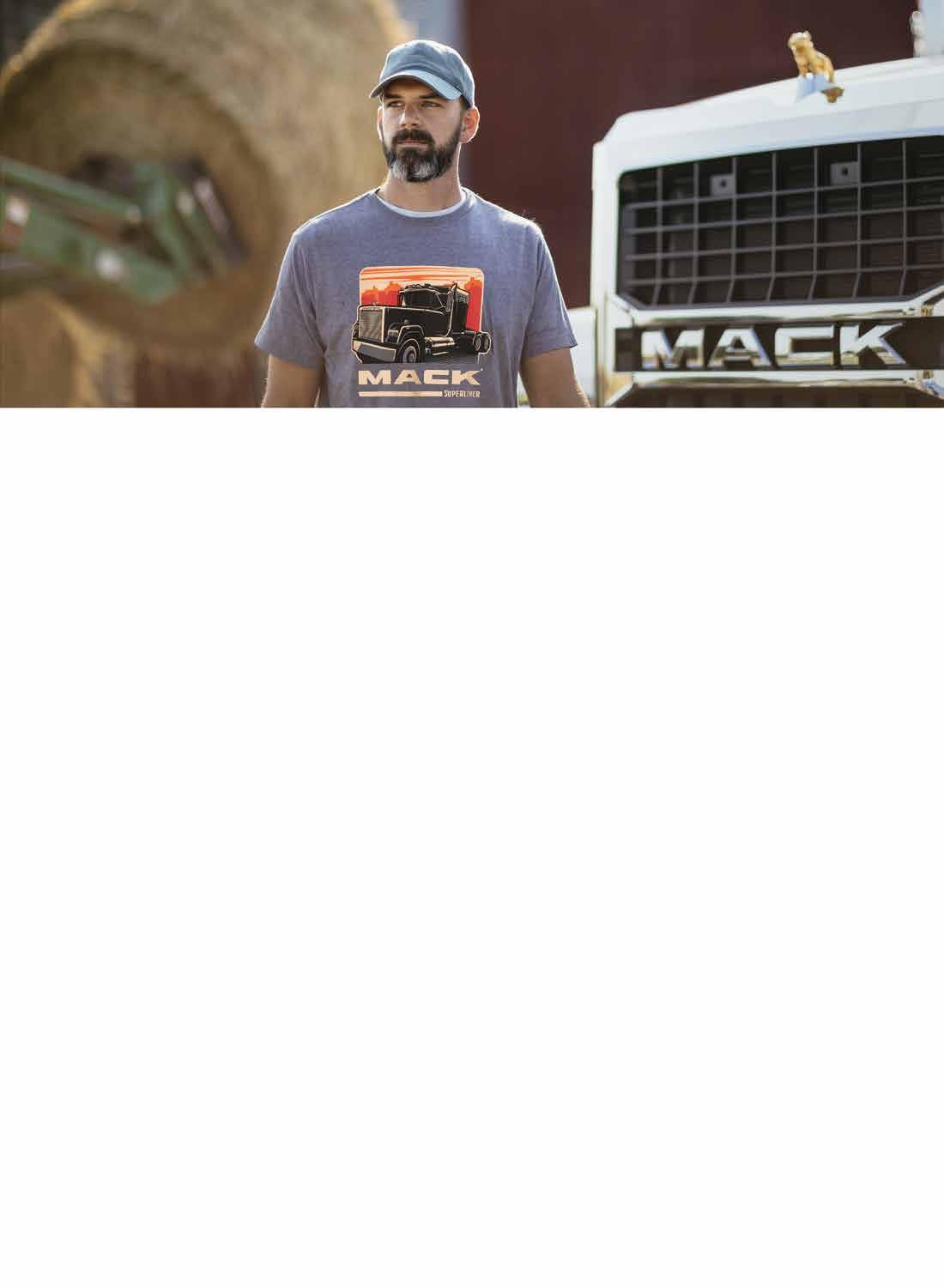
















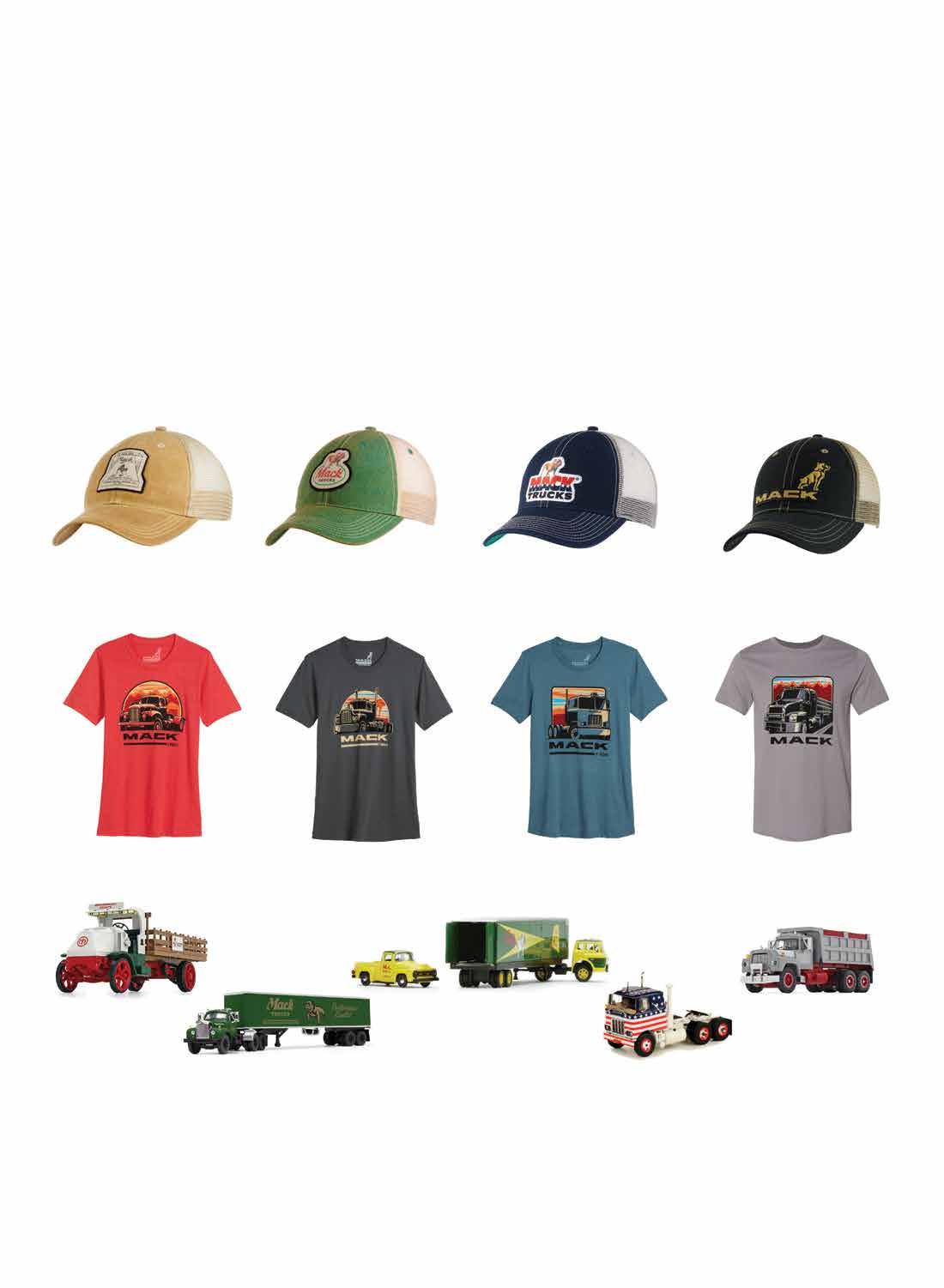
Mack B Model Graphic T-shirt M4448 Mack R Model Graphic T-shirt M4449 Mack F700 Model Graphic T-shirt M4450 Mack Anthem Graphic T-shirt M4452
Mack AC Stake Truck M1546 Mack N Model Cab with Retro Design M9245 Mack R Model Dump Truck M1330
Mack B-61 Performance Counts Truck M1446 Mack F700 American Flag Model Truck M1451
SAVE 15% OFF ALL MACK DIECAST THROUGH JULY 4 PROMO CODE: BULLDOG100


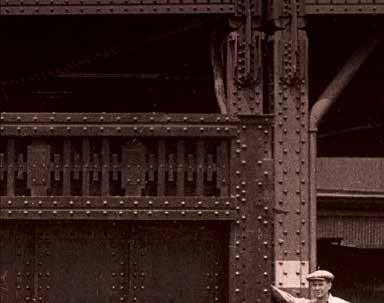
Bigley’s big babies



Bigley Bros. Inc. featured in 1952 Mack Bulldog magazine


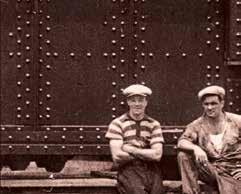
When William and Bernard F. Bigley Sr. fi rst started Bigley Bros. Inc. in 1912, they used horses to haul specialized loads across the New York City area. By 1918, the company operated 142 horses and specialized in hauling jobs that other teamsters couldn’t handle. In fact, it took 52 horses to haul a single girder before the massive power of a Mack truck was at Bigley Bros.’ disposal. In 1921, the company upgraded to operating Mack® trucks and the horses were sold at a public auction, except for the oldest horse which was retired to a New Jersey farm. For 50 years, Bigley Bros. Inc. was a standout company for specialized hauls located in Hoboken, New Jersey, with additional offi ces in New York City and Washington D.C. Between 1912 and 1962, the company transported steel that built cities, turnpikes and buildings, including the United Nations building. They did so largely with Mack trucks, and the strong partnership between the two companies — which factored into Bigley Bros.’ success — was featured in a 1952 article in Mack’s Bulldog magazine. While Bigley’s business was eventually sold, the family’s affi nity for all things Mack Trucks lives on. Special thanks to Joe Bigley for alerting Bulldog to his family’s rich Mack history.
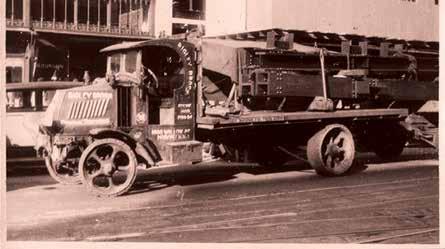
As seen in the 1952 Bulldog magazine story about Bigley Bros.
While many companies may consider twenty-ton loads as large cargo, it’s small stuff for Bigley Bros. The company can pull a load size up to 300 tons with each of their 71 tractors, most of which come from Mack Trucks. Completing the equipment lineup are 16 stake body trucks, 32 fl atbed trucks with winches, 35 heavy duty trailers, 60 platform trailers, 38 pole and girder trailers and 15 pickups.
Quite a bit of work goes into shipping and delivering before the drivers ever get on the load. The fi rm fi rst checks existing roads for sharp corners, overhead wires and low bridges. It’s not beyond Bigley Bros. to create its own roads across fi elds, meadows and swamps, as was the case for transporting the huge steel girders for the New Jersey Turnpike. Special wire mats are also used on a route with uncertain terrain.
The company’s transportation of especially long girders serves as a testament to the skill of its drivers. Two Mack diesels and a “jeep,” a specially made trailer similar to a dolly that is situated in the center of the load and distributes the weight across additional wheels, work together to deliver the girder, with one Mack driving backward and the other going forward.
Another big haul no match for the company was transporting all of the structural steel for the newly constructed United Nations Headquarters across New York City to the East River site.
The reason the company uses Macks is because, despite the beating they take during service, they still outlast the competitors.
The equipment is not only the best of the best, but the drivers are too. Bigley Bros. recruits its men from groups of experienced drivers. One of the best drivers that the company ever had was a man with one arm who drove for them for almost 30 years.
Back in the day when Bigley Bros. was fi rst starting, they used horses instead of Mack trucks. The photo above the headline shows a team of horses hauling a girder.

Bigley Bros. has achieved national recognition for the ability to take on unique loads. Whether they carry long girders or special machinery, the skills and experience of the company drivers stand up to the challenge.
If it’s big, it’s Bigley’s baby.
Mack Trucks, Inc. World Headquarters 7900 National Service Road Greensboro, NC 27409
Offi cial Hauler of
A salute to Bulldog’s readers

When planning the special Centennial issue of Bulldog magazine, we asked our readers how Bulldog has affected them over the years. We received a number of letters and emails. One was from Linda and Bill Schooley of Hamburg, New York, who graciously loaned us their copy of Bulldog from 1926.
“We have enjoyed every [Bulldog] issue over the years and have often shared some ‘Built Like a Mack Truck’ phrases. We enjoy thinking of the old days of hauling materials to job sites around western New York with our own Mack dump trucks. Congratulations on your 100th!” Our thanks to Linda and Bill and all the others who contributed to this issue. And thanks to all of our loyal readers.
Subscribe to Bulldog magazine today
Stay up to date with all things Mack by subscribing to Bulldog magazine. Bulldog has been informing Mack customers and fans for 100 years and counting, and is more useful than ever. Each issue is free and contains the latest news about Mack, its trucks and services, plus useful information for anyone in the trucking industry. Go to macktrucks.com/community/bulldog-magazine to subscribe online and don’t miss an issue.

